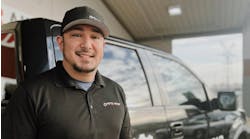When you introduce a new service to your dealership, not only do your customers have to want it, but your staff members have to believe in it and be on board, as well. Although a change could be made to better solve a problem, initially, that change—no matter how great—is going to take some getting used to, says Mark Bailey, fixed operations director of Austin (Texas) INFINITI.
One such example was when he created a service express lane in his service department in 2011 after he noticed the amount of maintenance work coming in began to diminish.
“We kind of had an easy go of it for a long time. Our clients would come in, go by the maintenance schedules [and we would] have plenty of work to do,” Bailey says. “Warranty work has steadily dwindled and dwindled.
“We have mainly had to find ways to overcome the gradual reduction of maintenance items recommended by the manufacturer.”
With over 30 years in the dealership industry, including time spent as a Firestone manager and independent repair facility owner prior to dealerships, Bailey knew that customers were looking for fast, efficient service and he thought a service express lane would be a beneficial investment.
“You can’t halfway do express service,” he says. “It’s got to be just like anything else that we do.”
Although it was set to be a successful investment, it took some time to get used to, Bailey reveals, which initially affected the business—and efficiency. The latter, in fact, took time to resolve and restore efficiency to what it once was.
“My own personal opinion is you’re looking at a good year to really get jamming along where it’s working well for you,” he says. “[Staff] initially can get very discouraged and say, ‘Ah, man, this is not what I expected.’”
“You have to be somewhat stubborn with your team and just make it work.”
The Early Days
According to Bailey, during the early stages of the express service, he saw his effective labor rate and dollar per repair order drop during the introductory stages of the express service.
“We had a couple of recent tech school grads that were working as helpers,” he says. “We made these two our first ‘express team.’ We functioned with a two-man team for the first two years.”
As the service express began to grow, however, the shop was unable to keep up with workload and promise times were not met, Bailey says.
“Express volume continued to increase to the point where we could not perform at a satisfactory level without adding additional express service personnel,” he says. “We were not able to consistently achieve promise times—one hour including a multipoint inspection and car wash—due to increased workload.”
After the first full year in 2012, the express lane brought in $55,460 in gross profit for labor and parts, Bailey says.
Refining the System
In order to become more successful with the express service, Bailey added staff to meet the service express segment’s growth, as well as put procedures in place to follow.
Today, the service express staff has grown from two employees to a staff size of six (split into two teams), he says. According to Bailey, four out of six express technicians are graduates of the Infiniti Technician Training Academy, which has been a go-to recruiting source since 2018.
Another key has been a focus on consistent processes, each and every time.
“You have to put an efficient process in place—both for your technicians and your customer and make sure people are sticking to it,” Bailey says.
For example, there is a set procedure that outlines exactly how to perform the inspection along with the oil change, so that the lane runs as efficiently as possible.
“With the assistance of service operations specialists, we added a specific, choreographed and mapped process for all steps in the express service oil change, from beginning to end,” he says. “Our goal is to complete the inspection and oil change in 25 minutes,” Bailey says.
If the workload is heavy, the shop will pull in other team members to get the job done.
“An A-tech can do an oil change,” Bailey says. “Yes, if I was doing that all day long that would be crazy, but the name of the game is to get the car in and out and looked at quickly, and if [clients] are waiting for a C-tech, then I’m hurting myself.
“Every tech in the shop needs to be as productive as possible; sometimes your A-techs are going to do lower-skilled work.”
In order to make sure all of the processes are going smoothly, Bailey meets with his managers throughout the month.
“One thing I can’t stand is micromanaging,” he says. “I feel like if you pick good people to begin with and let them do their job and perform, they’ll come through.”
Later, the managers will meet with technicians and take care of issues head-on, Bailey says.
“Not too often do you have to have a heart-to-heart,” he says. “These guys take care of a lot of things themselves, and if somebody is not cutting it, they’ll [address the situation].”
Ultimately, the staff takes care of one another and has made the service express an investment with the business.
“I just try to facilitate and keep a big picture, five-mile view on things, and let everybody do the things that they need to do,” Bailey says.
Measuring the Results
Since bringing in the express lane, the service department has seen an increase in revenue, as well as efficiency.
“The biggest thing we focus on is the process, and sticking to it consistently,” Bailey says.
According to Bailey, in-bay times improved by roughly 15 minutes utilizing the express service process.
“On average, we have seen a 9 percent increase in customer pay repair order year over year with express service,” Bailey says.
In 2018, express service generated $842,487 in fixed gross.



